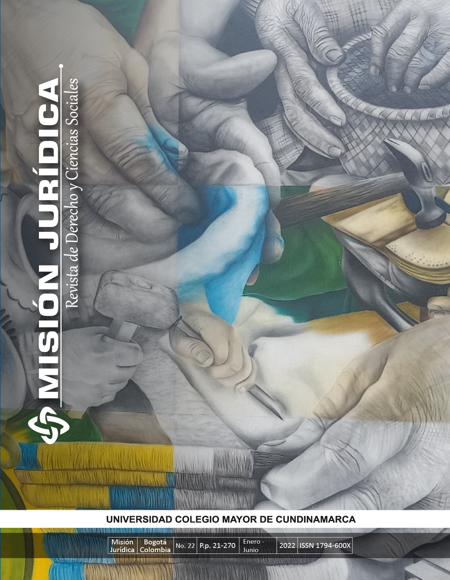The extinction of federal public trusts and the right to scientific development and technological innovation: a matter of human rights
La extinción de los fideicomisos públicos federales y el derecho al desarrollo científico e innovación tecnológica: un asunto de derechos humanos
COPYRIGHT PROVISIONS
Every papper included in the magazine can be reproduced whole or in part, provided that respect for its original content, the source is acknowledged and is used with non-commercial academic. Legal mission and its content is protected under a license Creative Commons Attribution-Noncommercial-

Misión Jurídica is distributed under a Creative Commons Attribution-NonCommercial-NoDerivar 4.0 International License.
Based on a work in http://unicolmayor.edu.co/publicaciones/index.php/mjuridica/index.
Permits that go beyond what is covered by this license can be found at http://unicolmayor.edu.co/publicaciones/index.php/mjuridica/index.
Show authors biography
The main objective of this article is to specify that science and technology are elements that contribute to the dignity of people and that the implementation of certain government actions in relation to these matters tends to violate human rights, by virtue of the fact that there are no other duly established means to address this topic. In this sense, it should be specified that in Mexico, one of the main ways of supporting scientific development and technological innovation by the government was through public trusts. However, the current federal administration decided to order the termination of these administrative legal resources arguing the existence of great corruption, a circumstance that without being properly founded, the only thing that has led to is the violation of human rights of the population by not generating a legal security scheme for scientific and technological development in the country, a circumstance that will be addressed with the tools of the inductive method, under a qualitative research approach.
Article visits 251 | PDF visits 165
Downloads
- Abramovich, V. & Courtis, C. (2014). Los derechos sociales como derechos exigibles. Trotta.
- CONACYT. (2021). Reglamento del Sistema Nacional de Investigadores. https://n9.cl/9iur
- Constitución Política de los Estados Unidos Mexicanos. https://n9.cl/8o9n
- Decreto por el que se ordena la extinción o terminación de los fideicomisos públicos, mandatos públicos y análogos. Diario Oficial de la Federación. (2020). https://n9.cl/hjve4
- Estos son los 109 fideicomisos que desaparecen. (2020). El Universal. https://n9.cl/zd4ce
- Estrada, E. (2010). El Fideicomiso y los fondos sin personalidad jurídica. Editorial Universitaria Ramón Areces.
- Fiscalía General de la República. (22 de febrero, 2021). Oficio FGR/UTAG/DG/000916/2021. México.
- Fundar, Centro de Análisis e investigación. (2020). Fideicomisos en México. El arte de desaparecer dinero público. Cifras 2020. https://n9.cl/353s
- Gobierno de México. Secretaría de la Función Pública. (3 de abril, 2020) “Con la eliminación de los fideicomisos se cierra una página de opacidad, oprobio y corrupción: secretaria Sandoval Ballesteros”. https://n9.cl/0u9tb
- Instituto de Investigaciones Jurídicas de la UNAM. (2004). Enciclopedia Jurídica Mexicana, Tomo IV. Porrúa-UNAM.
- Ley Federal de Entidades Paraestatales. (2021). México. https://n9.cl/dlim
- Ley General de Educación. (2021). México. https://n9.cl/sabi
- Ley General de Títulos y Operaciones de Crédito. (2021). México. https://n9.cl/ziu5
- Ley Orgánica de la Administración Pública Federal. (2021). México. https://n9.cl/y1v5y
- Olivos, J. (27 de octubre, 2020). Extinción de fideicomisos públicos y corrupción. El Universal. https://n9.cl/8ycz
- Presupuesto de Egresos de la Federación para el ejercicio fiscal 2020. (2019). Diario Oficial de la Federación. https://n9.cl/nety
- Presupuesto de Egresos de la Federación para el ejercicio fiscal 2021. (2020). Diario Oficial de la Federación. https://n9.cl/lx132
- Pacto Internacional de Derechos Económicos, Sociales y Culturales. (2021). https://n9.cl/9knri
- Procuraduría Fiscal de la Federación. (2020). Relación de Entidades Paraestatales de la Administración Pública Federal. Diario Oficial de la Federación. México. https://n9.cl/ls6iq
- Ramírez, R. (2020). Detallan opacidad y corrupción en uso de fideicomisos.. Recuperado de https://n9.cl/5w0n
- Secretaría de Hacienda y Crédito Público. (2020). Informes sobre situación económica, las Finanzas Públicas y la Deuda Pública. México. https://n9.cl/l6or2
- Semanario Judicial de la Federación. (2021). Sistematización de tesis y Ejecutorias publicadas en el Semanario Judicial de la Federación de 1917 a la fecha. México. https://n9.cl/5wi4r
















